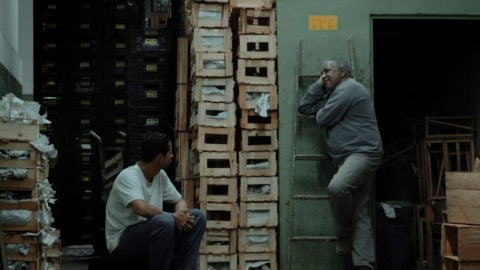ND/NF Interview: Nele Wohlatz
Nele Wohlatz’s films reside on the boundaries between different geographies and cinematic modes. The Argentina-based German filmmaker’s first feature, Ricardo Bär (2013), co-directed with Gerardo Neumann, is set quite literally at the border between Argentina and Brazil in a farming community populated by the Spanish-speaking descendants of German immigrants. When she and Neumann encounter resistance to making their documentary, what starts out as a character study of a young oddball farmer transforms into a wry commentary on the artifice of filming reality.
In her second feature and solo debut, Wohlatz burrows even deeper into the spaces between cultures, languages, and identities. The Future Perfect is a semi-fictional film about the real life of its lead actress Xiaobin, a young Chinese immigrant newly arrived in Buenos Aires. As Xiaobin painstakingly learns Spanish to adapt to her new milieu, her coming-into-language becomes a coming-of-age of sorts. It’s an opportunity for her to rearticulate her identity and escape the social class she was part of in China, to rebel against her insular parents who refuse to integrate into Argentine culture, and to explore romance with an Indian immigrant, Vijay, with whom she shares nothing except broken Spanish.
Shot with a sense of deadpan comedy, the film’s ingenious conceit is to hitch its storytelling to Xiaobin’s progress in language learning: as she learns new tenses in Spanish class, her narrative expands in parallel, moving from the past, to the present, to finally, the conditional future of the film’s title, which allows her to vividly imagine the possible paths her life might take. Wohlatz aptly renders the affectless speech and constricting alienation of an immigrant with plain, naturalistic photography and a functional mise-en-scène. It is a deceptively simple but layered enunciation of what it means to find oneself—as speaker, actor, and director—within a foreign language.
Film Comment spoke with Wohlatz in New York in advance of the New Directors / New Films screenings of The Future Perfect on March 18 and 20.
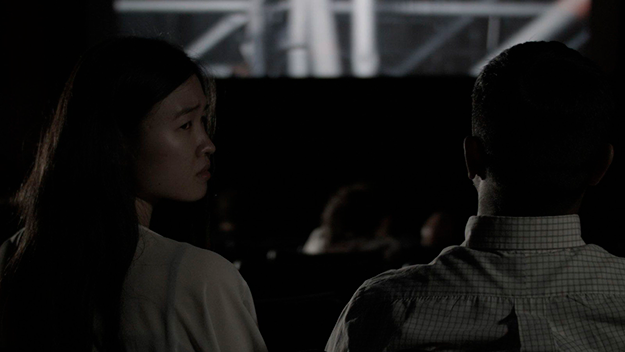
The film is heavily based on Xiaobin’s life. Did you have the idea for the film before you met her or did she inspire the concept?
I had the idea to make a film about what it means to move to another country, lose your mother tongue, and start everything from scratch. I went through this process myself, and though I was over it when I had the idea for the film, I still had a lot of questions about how I could start directing films in Argentina in Spanish as a foreigner. So I said okay, I have to make a film about this moment, which I know very well and can talk about. I asked the language institute where I was teaching German if I could interview students who were studying Spanish. That’s how I met Xiaobin. Once I met her, I really wanted to do this film with her. I started spending a lot of time with her and began writing the script based on her life. So it’s a mix of both of our experiences.
How did you develop the film’s narrative?
When I was looking for a foreign woman for this film and meeting with the Chinese students at the language institute, they invited me to watch a theater piece they did in Spanish for the end of the school year. The play itself didn’t make a lot of sense—it was a part of a classical Chinese play situated at the beginning of the 20th century and it didn’t have anything to do with their lives. But what was very interesting was that they had just started to study Spanish and they had this physical struggle with the language, with making these new sounds and speaking this new grammar. They had learnt the text just by memory, and maybe just by sound. The structure was that one student would come to the front of the stage, say his text, and then go back. And then another would come, and then another. The text was not interesting at all, but what was happening there was fascinating because you had this overlaying of fiction over real, physical drama.
And the drama wasn’t the play.
No, the drama wasn’t the play at all—it was their bodies. It really touched me and I thought that I would like to try and somehow rescue this tone for the film. So we wrote the script and did acting exercises with Xiaobin to figure out how to bring together this fictionalized story and this real drama of what it means to translate yourself to your new language. I wrote the script together with a co-writer [Pio Longo] and we had this idea that the Spanish classes would be the structure for the film, or the skeleton, and that every time she learnt something new the plot would move forward.
There is something so interesting about learning a new language through fictional narratives. For instance, in your short Three Sentences for Argentina, when the Chinese student is asked “Where did you go to holiday?” he says, “I went to Switzerland.” And you don’t know if he actually went to Switzerland or if he’s just reciting lines from a book.
Language classes are full of fiction, you know, and language books are full of dialogues. You have to role-play. Where have you been to holiday? You say you’ve been to Switzerland. But you’re actually in a classroom in New York. It’s fiction and it obliges you to act in a lot of ways. You don’t only have to learn your new text, but like actors, you also have to learn how to find yourself in this text. When they give you your first vocabulary and your first dialogue, it’s the same, it’s your new text for your new life, and now you have to find out how to be this role, how to be “me” in broken Spanish. When you do this you also find out that you have more than one identity.
You said in an interview that though you are exploring autobiographical concerns with this film, you didn’t want a European immigrant like yourself to be the protagonist. Why was that important to you?
I wanted to capture this distance between the protagonist and her new society. It was very important that Xiaobin was from a different culture from me in order to capture this distance. I believe in this distance in film and in life, too… I think that our relations with others are full of non-understanding and distance, and even our relationship with ourselves is full of this dis-understanding, and from time to time there’s a moment of connection with yourself or with others. I found it much more convenient to have someone I didn’t understand totally, because it allowed me to have some mystery in the film and to leave things unexplained, but at the same time enjoy the moments of connection. For instance, I never understood Xiaobin’s relationship with Vijay.
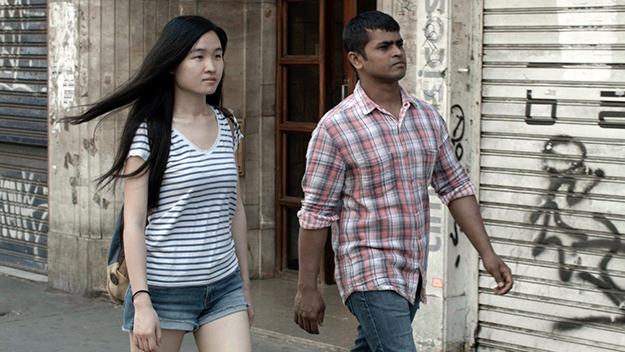
I was about to ask you about that. Xiaobin’s relationship with Vijay seems improbable, in a sense, since they’re from such different cultural worlds and can only communicate in broken Spanish.
It’s also improbable because it’s totally forbidden by both families. But I thought that for them it’s important that they share this broken Spanish. They are both foreigners and they are both alone and separated, so this somehow binds them. And also, I thought that maybe he was kind of a provocation? This moment in Xiaobin’s life was marked by her fight for independence and a coming-of-age conflict with her parents, who have a different vision of immigration and integration. Even though they didn’t know about him, he was a big provocation, a sign of rebellion.
I was very struck by the scene in which Xiaobin visits Vijay soon after he asks her to marry him. She delivers a monologue in Chinese, and it is the first time in the film that she pours her heart out not just to Vijay but also to us, the audience. And it’s so poignant, because Vijay cannot understand a word of what she says. How did you come up with that scene?
In the beginning, we avoided scenes in which she would be able to speak Chinese, because we wanted to capture this moment when you’ve just lost your mother tongue, but you’ve also not arrived at the other language yet. If Xiaobin just resolved everything in Chinese, then she would be stuck like her parents, and we wouldn’t be able to tell our story.
Our working language was always Spanish, which was part of the game. I thought this film would really be, in large part, scripted by language books. It’s about this moment in life when you suffer because your new text is a language manual. But I also wanted her to have her moment of speaking fluently in Chinese and telling us what she thinks. In that scene, Vijay is just an excuse for her to tell us, the audience, what she thinks.
The film dramatizes—and even makes comedy—out of Xiaobin’s vulnerabilities and her missteps. How did you prepare her, as a non-actor, for such a personal performance?
Xiaobin has a true sense of humor. We laughed a lot together when talked about our experiences and developed the film. I told her that I generally like it in films when people do funny things without themselves laughing. That gives me more freedom to laugh. I showed her some moments of Buster Keaton films to make her understand what I meant. But we also had one rule when we were writing the script—that whenever we laugh at her, she always has to come out on top. It should never end with her in a disaster. She’s always getting out of every situation as a winner. For example, she’s not able to order a meal at a restaurant, but then we see her eating a hot dog.
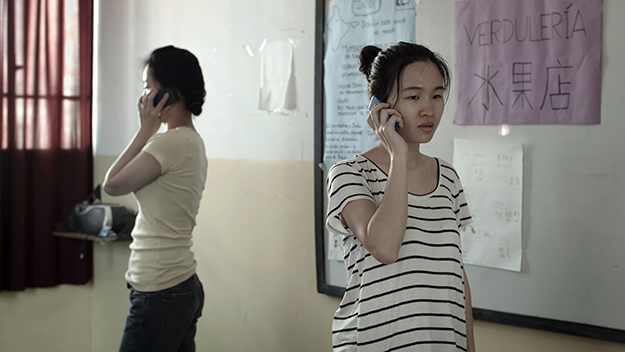
Did you share any Bresson films with her? The minimalism of The Future Perfect reminded me of his work.
Yeah. I like him a lot. The Future Perfect is not a Bresson film, I think, but I really don’t like actors who act out everything psychologically to try and explain their characters because I feel like life is not like that. We understand so little about us and the world. So I feel close to Bresson’s films. I showed her scenes from some of his films—also to make her understand what I was looking for in our acting exercises, because she has a different background. You see in the ending of the film that she has this idea of cinema as melodrama. It was helpful to show her my taste so she would know that this is also a universe that exists.
The cinematography and mise-en-scène of the film are very simple and naturalistic in the beginning. But the style grows more and more complex as Xiaobin’s mastery over Spanish evolves. Can you describe how you developed the formal aspects of the film?
Xiaobin didn’t choose to go to Argentina and she didn’t have any concept of Buenos Aires when she arrived. She went there because her parents had immigrated there earlier and they wanted to bring the family together again. For her, it was basically an opportunity to leave China and go to a big city. And I was also thinking about how, when you go to a new place and new city, you’re just a visitor. You don’t share your own history with the city, and everything is very superficial, very plain. But when you spend more time, you imprint your own experience on the city, you share history, and things get deeper.
I thought that this should be expressed in the film. So in the beginning, everything is very void-like and plain and rough, and it doesn’t have that much detail. The scenes are also very short and there aren’t many dialogues, because there are no possibilities for dialogue for Xiaobin. And then it gets smoother and longer because she goes deeper into her new world. We just translated this very directly to the camera’s language.
While looking for locations, we decided that the film should have very few places, only the essential places. Not the essential places of Buenos Aires, but the essential places for an immigrant, where she can eat, sleep, work, and learn Spanish. Because everything has to start from scratch. The city has no history for Xiaobin and Xiaobin has no history for the city. She has to build her new ABC, not just in her new language, but also in her use of the city. So the camera also has to build up its own ABC of filming her.
While we’re talking about the city, what’s the significance of the ocean in the film? You open the film with a shot of the ocean and then it returns in that one scene when Xiaobin’s friend points to Uruguay in the distance, across the ocean, and Xiaobin cannot see it.
The shot at the beginning, it’s actually not a sea. It’s the Rio de la Plata, which is an estuary, so technically it’s still a river. And on the other side there’s Uruguay. But you normally cannot see Uruguay, so if you’re new to Buenos Aires, you think it’s the sea.
When Xiaobin’s Chinese friend says “Ah, you cannot see Uruguay? Must be because you’re shortsighted”— in that moment, you don’t know, and she doesn’t know if she can’t see Uruguay because she’s shortsighted, or because it’s not there, or if her friends are lying to her. I found that interesting, how language can confuse your vision of reality.
At the beginning of the film, I just needed a shot, because I didn’t want to suddenly start the film with Xiaobin’s interview. I just needed one image there. The film almost never uses empty images, because every shot is functional. But I thought the opening shot could only be this river, because it’s just this water and the grey sky. It’s nothing and it can be everything. It can be the sea between China and Argentina. It’s actually where the first Chinese immigrants came over in container ships. For me, it’s like a screen for projection: void, and then we start to paint things on it.
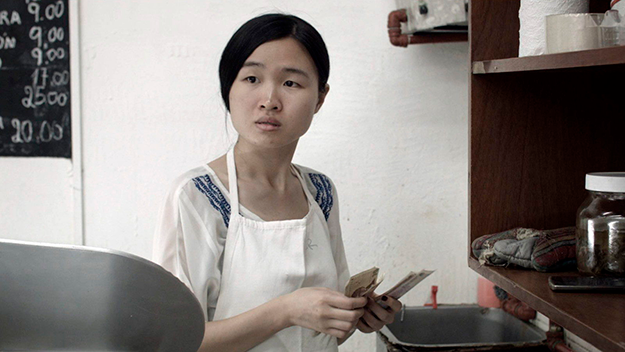
Can you describe the function of the language classes in the film?
In the Greek theater, there’s always the chorus interrupting the drama. It represents the social group of the hero or antihero. This chorus discusses what the [protagonist] is doing right now, what she will do next, and if it is good or bad. In Medea, it’s the chorus of the women. I thought the students in the language classes would be like a chorus. They would be commenting on Xiaobin’s life and anticipating her next steps, but using the text of the language manual or the language class.
In your documentaries Ricardo Bär and La Mochila Perfecta [2014], the restrictions you encountered while filming become the subjects of the film. Did you encounter any such restrictions while making this film?
In the films you mentioned, at some point there was someone telling us not to film. I’m very happy that that didn’t happen with The Future Perfect. But it’s also a film with a lot of restrictions in the sense that we had very little money, and we could only shoot on weekends because Xiaobin was working during the week, and Malik, who plays the role of Vijay, was only free to shoot on Sunday. And then there were other restrictions—we couldn’t go into the house of the parents. For me, that was a nice restriction because then I thought, okay! Let’s resolve this in another way.
Do you think your cinematic language is affected by the fact that you’re an immigrant filming foreign subjects in a foreign language?
We talked so much about how this film is based upon the immigrant experience. I don’t know what my next film will look like, but I like that every film makes up its own system. In this film, you’ve noticed that the camera is very functional—it’s not doing things that are beautiful for the sake of it, but working always in Xiaobin’s perspective and as a functional instrument for the story. I like doing it this way. I think the cinematic language comes from the subject and from the story.
You’ve expressed your admiration for Abbas Kiarostami and his docufictional approach to cinema. He said, famously, that “We can never get close to the truth except through lying.” What possibilities does fiction open up to a documentary filmmaker like you?
I don’t think I’m a documentary filmmaker. I’m a filmmaker and I’m not interested in the distinctions between documentary and fiction. Kiarostami is so great because he started to make films which are beyond this distinction. At the beginning of cinema, there wasn’t this distinction, it came up later. Of course, facts are very important—nowadays they are really very important—but I don’t think film is the medium where I want to get facts. I don’t believe in facts in films. I believe in the experience.



